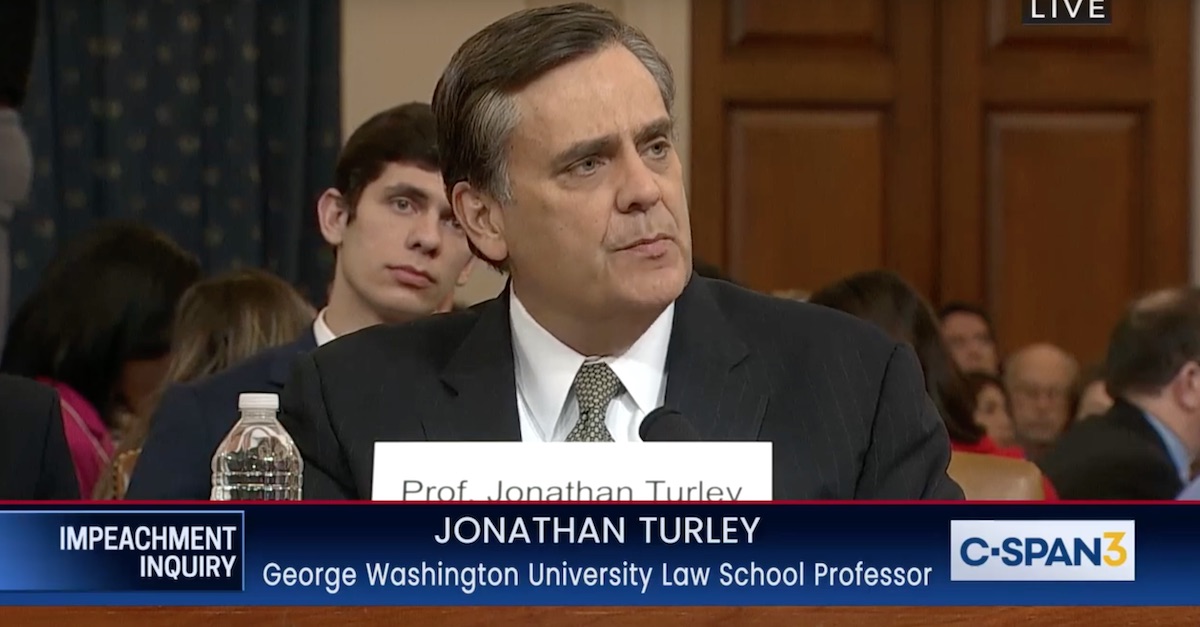
The panel of law professors and constitutional law experts convened as expected at hearing Wednesday before the House Judiciary Committee. The day after the House Intelligence Committee published its report, the scholar-witnesses’ opening statements have been released. Harvard Law professor Noah Feldman, University of North Carolina law professor Michael Gerhardt, Stanford Law professor Pamela Karlan were called by Democrats, while George Washington University law professor Jonathan Turley was called by Republicans. It is Turley’s statement we’ll focus on here, as Turley’s law professor colleagues unanimously said that the president has committed an impeachable offense.
CNN legal analyst Ross Garber, host of the Law&Crime podcast series Real Impeachment, noted the differences between Turley’s argument and those put forth by the others. Turley rejects the idea that there’s enough proof of President Donald Trump’s intent behind demands for announcements of Biden probes and the withholding of congressionally appropriated military aid to Ukraine. Note Turley did say later that “the use of military aid for a quid pro quo to investigate one’s political opponent, if proven, can be an impeachable offense.”
Turley began with nostalgia for impeachments past.
“Twenty-one years ago, I sat here before you, Chairman Nadler, and other members of the Judiciary Committee to testify on the history and meaning of the constitutional impeachment standard as part of the impeachment of President William Jefferson Clinton,” he said. “I never thought that I would have to appear a second time to address the same question with regard to another sitting president. Yet, here we are.”
From, here the theme was “anger.”
The law professor, after pointing out that he is not a Trump supporter, said that he was “concerned about lowering impeachment standards to fit a paucity of evidence and an abundance of anger”:
I would like to start, perhaps incongruously, with a statement of three irrelevant facts. First, I am not a supporter of President Trump. I voted against him in 2016 and I have previously voted for Presidents Clinton and Obama. Second, I have been highly critical of President Trump, his policies, and his rhetoric, in dozens of columns. Third, I have repeatedly criticized his raising of the investigation of the Hunter Biden matter with the Ukrainian president. These points are not meant to curry favor or approval. Rather they are meant to drive home a simple point: one can oppose President Trump’s policies or actions but still conclude that the current legal case for impeachment is not just woefully inadequate, but in some respects, dangerous, as the basis for the impeachment of an American president. To put it simply, I hold no brief for President Trump. My personal and political views of President Trump, however, are irrelevant to my impeachment testimony, as they should be to your impeachment vote. Today, my only concern is the integrity and coherence of the constitutional standard and process of impeachment. President Trump will not be our last president and what we leave in the wake of this scandal will shape our democracy for generations to come. I am concerned about lowering impeachment standards to fit a paucity of evidence and an abundance of anger. If the House proceeds solely on the Ukrainian allegations, this impeachment would stand out among modern impeachments as the shortest proceeding, with the thinnest evidentiary record, and the narrowest grounds ever used to impeach a president. That does not bode well for future presidents who are working in a country often sharply and, at times, bitterly divided.
Turley said that, at this rate, this impeachment over the Ukraine Affair is shaping up to be the “shortest,” on “thinnest” evidence, an on the “narrowest grounds.” Hence his concern.
“As I have stressed, it is possible to establish a case for impeachment based on a non-criminal allegation of abuse of power. However, although criminality is not required in such a case, clarity is necessary. That comes from a complete and comprehensive record that eliminates exculpatory motivations or explanations,” Turley said. “The problem is that this is an exceptionally narrow impeachment resting on the thinnest possible evidentiary record. During the House Intelligence Committee proceedings, Democratic leaders indicated that they wanted to proceed exclusively or primarily on the Ukrainian allegations and wanted a vote by the end of December. I previously wrote that the current incomplete record is insufficient to sustain an impeachment case, a view recently voiced by the New York Times and other sources.”
“In the current case, the record is facially insufficient,” he added.
In closing, Turley was “candid” and again mentioned anger.
I get it. You are mad. The President is mad. My Democratic friends are mad. My Republican friends are mad. My wife is mad. My kids are mad. Even my dog is mad . . . and Luna is a golden doodle and they are never mad. We are all mad and where has it taken us? Will a slipshod impeachment make us less mad or will it only give an invitation for the madness to follow in every future administration?
That is why this is wrong. It is not wrong because President Trump is right. His call was anything but “perfect” and his reference to the Bidens was highly inappropriate.
It is not wrong because the House has no legitimate reason to investigate the Ukrainian controversy. The use of military aid for a quid pro quo to investigate one’s political opponent, if proven, can be an impeachable offense.
It is not wrong because we are in an election year. There is no good time for an impeachment, but this process concerns the constitutional right to hold office in this term, not the next.
You can read the 53-page opening statement below.
Turley opening statement by Law&Crime on Scribd
[Image via Image via CSPAN screengrab]